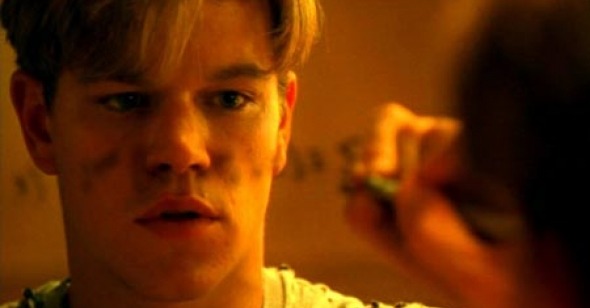New Math
Justin Stewart on Good Will Hunting
It's not often that a director disappears quite so purposely as Gus Van Sant did into Good Will Hunting. It's an almost ass-covering conceit, with a whiff of pretension—”This isn't my art,” it says, while providing the people some capital-E entertainment. The next year would reveal the personal project that had to be put on hold while Van Sant condescended to the masses: a shot-by-shot Psycho remake, which you have to admire, if only for its sheer gumption. But Psycho didn’t end up making one regret any time Van Sant might have spent “wasting” his talent on mediocrity. Considering that he’d made his last strong movie in 1989, and that his next one (Last Days) was still eight years away, it seems peculiar to single out this and Finding Forrester as director-for-hire “experiments,” and in any way separate them from the others.
“I was trying to make it not like something I would do,” Van Sant has said. “I was trying to present it like something I had seen elsewhere.” In the old days, they called this act of turning a screenplay into moving images with sound to make back the producers' money “doing your job.” To Van Sant it was exercise, something to oil the gears and maybe teach him techniques he could use for his more personal work. He also claims he viewed it as an art stunt or a magic trick—how invisible can a director become? If his ploy was this sort of intentional defying of auteurism, he complicated it before cameras started rolling by working with a screenplay that already had built-in themes—in particular, exceptional male sensitivity oppressed by environment—he has explored elsewhere.
Whether or not his intention to leave no traces of himself was a facile pursuit, the fact is that Good Will Hunting derives much of its push and verve from this very struggle. The act of attempting to not leave a stamp becomes the stamp. You can't feel it in every frame—Van Sant does “achieve” anonymity throughout much of the film. But what makes watching it an often more exciting experience than laboring through his “Death Trilogy” is the treasure hunt aspect, the delight in unexpected dashes of recognizable Van Sant, like the peculiarly dark lighting (as if math were a sordid pastime) of Will's study/sanctuary (like the shadowy Mala Noche), or the silent elevated train ride, the dusk sun flickering off Will's contemplative face in a purely Van Santian vision of the idealized young male.
Comedian Patton Oswalt has a good bit about the bragging rights of souls in eternity who died in the apocalypse, how they'd recount when a bloody image of Avril Lavigne's face “recited the Good Will Hunting screenplay, then the words turned into sentient razors and they bored into your flesh, George Bush was president and mediocrity held sway!” It seems possible. There's something hostile, even violent, about the way this movie's writing screams for attention. As much as Van Sant and Elliott Smith are able to mute it, Good Will Hunting still gives one a feeling for what it must have been like for Matt Damon and Ben Affleck in meetings with the Weinsteins (“Emotion the fuck out of this scene!”). Its bizarre self-confidence leaves you with a constantly dueling urge to scoff or applaud. Its glibness is astounding: writers' names are routinely offered as substitutes for insight; Will's incredibly unlikely genius is explained with, “I could always just play”; references to childhood abuse supply insta-depth. Cole Hauser and the Affleck brothers' dumbed-down patois (“Here's yah fuckin' double burgah!”) approaches insult with its equation of steady profanity = authenticity equation.
But the thing works—if only more movies moved so fluidly. You want to see Will succeed, even if the very supernaturalism of his ability precludes its relevance to anything happening on this planet. You're constantly stumbling over awkward lines (“it's just as aahbitrary as drinking coffee,” “I will fucking end you”), but it carries you satisfactorily from point A to B, with the persistent novelty of seeing the screenwriters in the frame. It's easy to knock Williams for his bipolar approach to acting (comedy is frantic jumping about, drama is lowering your voice a couple octaves), but his Sean is appealingly weary, “bloody but unbowed,” and his presence is at least more vital than Judd Hirsch's Ordinary People shrink. Stellan Skarsgard has the most fun, pumping Sean's rival, math sage Lambeau, full of sweaty bitterness and barely contained seething jealousy. Their contested Fields Medal, and the tiff that ends with both grown men on the floor, neatly encapsulates the divide between Will's idealism and their defeat at the hands of intellectual envy.
I hate it, but, goddamn it, I respect it. The movie's inner conflicts—the clash between the screenplay's earnest emo-naiveté (Van Sant called it “Hallmark Presents”) and the director's academic but noticeable effort to stay invisible—give it its texture and flow. He would essentially remake it a few years later with Finding Forrester, an even more ridiculous movie in its way, before a BAM screening of Béla Tarr’s Sátántangó lit another path.
